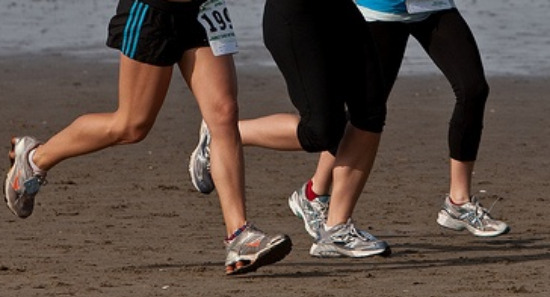A woman at my office is a marathon runner and a triathlete. She often talks about the energy bars and gels she eats during her workouts and her races. This got me thinking about my eating habits while running.
I’m torn on this issue. As a personal trainer, it is part of my job to address the nutritional needs of clients and/or people I administer advice to. Yet, as a runner, I know what my body needs and doesn’t need. I have never been the type of runner who needs to eat before a run or even during a run. The thought of eating during a run actually makes me a little nauseous – anyone else? I think my no eating while running mindset is spurred by the idea that I’m not really a competitive runner anymore. Although I still run 5K’s and 10K’s, I still don’t feel the need to eat during the runs.
Putting my personal trainer hat back on – here’s my take on eating and running. Obviously, if you’re a competitive runner, eating for performance is key. But for new or noncompetitive runners, there are just a few basic eat and run principles to consider:
Principles of Eating and Running
Before Your Run: If you’re a morning runner, who’s out the door before breakfast, you may want to grab a little nourishment before you’re workout. Don’t eat too much or you’ll risk cramping or even nausea. Have a 100-150 calorie snack that has some form of carbohydrates, such as a ½ cup of oatmeal, a small banana, or half a power bar. Drinking a few ounces of water prior to running is also a good idea. Resist gulping or else you may feel waterlogged even before you start your run. For afternoon or evening runners, avoid eating a heavy meal prior to running. Schedule your run in between lunch and dinner, or 1-2 hours after dinner. Remember, there are plenty of runners who CAN run on an empty stomach with no problem (yours truly included), but eating a little something beforehand is also fine.
During Your Run – The rule of thumb is – runners really do not need to eat during a run unless they run 60 minutes or more. Our bodies have stored glycogen (our energy source) that can help us through the sub-hour runs. If you plan a run that is 1+ hours, take an energy gel or a small box of raisins for refueling along the way. For long runs, staying hydrated is also key so remember to drink your water – at least a few sips every 15 minutes!
After Your Run – After a long/hard run, aim to eat within 30-45 minutes of ending your workout. This will help prevent your blood sugar levels from dipping too low. Aim for 200-400 calories that includes protein and carbs. My post-run snacks are often Greek yogurt, protein bar, peanut butter, Kashi cereal, etc., Also, drink plenty of water after your run and throughout the day to rehydrate!
Eat, drink, and run well.


Great post.
I’ve been wondering about this. My runs are very short – less than 3 miles. But my morning runs are so much more difficult because I feel I don’t have the energy to go as far as I would normally during an evening run. I try to eat something before (like a fiber bar or even a glass of milk), but it doesn’t always work.
Irene, In your case, I would eat a little something about 20-30 minutes before your run. Sometimes, eating right before a run can make you feel sluggish because your body is using energy to digest.